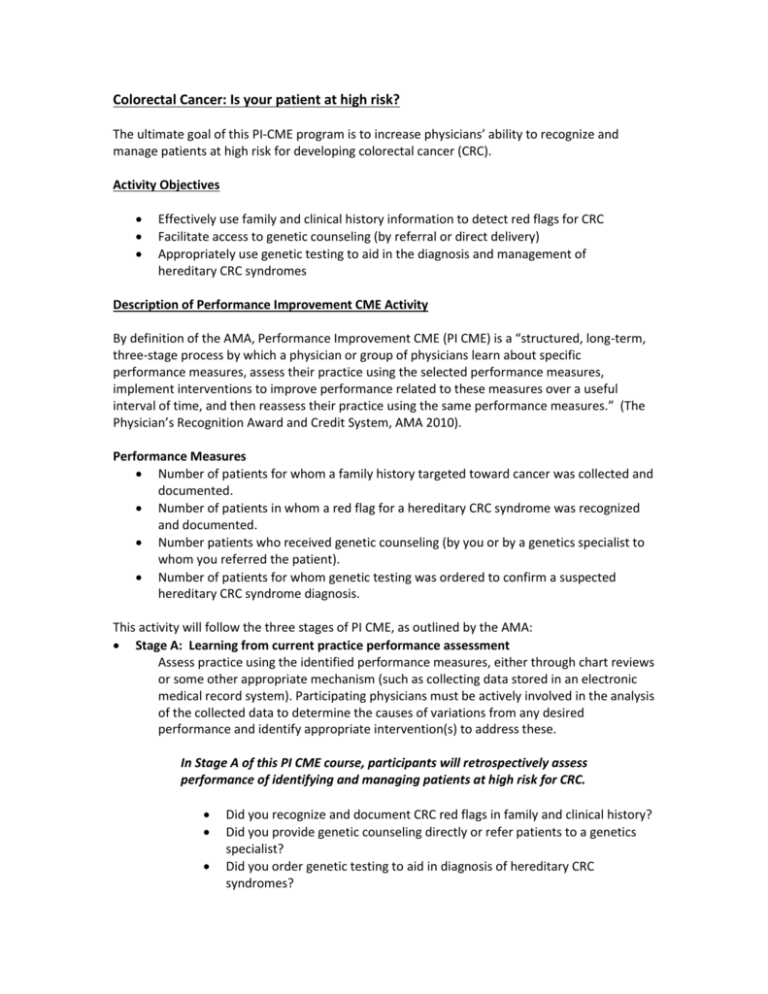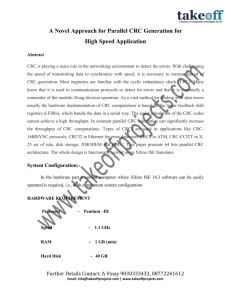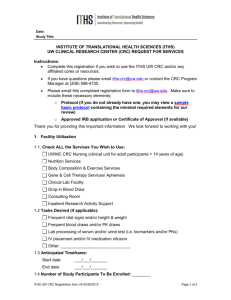
Colorectal Cancer: Is your patient at high risk?
The ultimate goal of this PI-CME program is to increase physicians’ ability to recognize and
manage patients at high risk for developing colorectal cancer (CRC).
Activity Objectives
Effectively use family and clinical history information to detect red flags for CRC
Facilitate access to genetic counseling (by referral or direct delivery)
Appropriately use genetic testing to aid in the diagnosis and management of
hereditary CRC syndromes
Description of Performance Improvement CME Activity
By definition of the AMA, Performance Improvement CME (PI CME) is a “structured, long-term,
three-stage process by which a physician or group of physicians learn about specific
performance measures, assess their practice using the selected performance measures,
implement interventions to improve performance related to these measures over a useful
interval of time, and then reassess their practice using the same performance measures.” (The
Physician’s Recognition Award and Credit System, AMA 2010).
Performance Measures
Number of patients for whom a family history targeted toward cancer was collected and
documented.
Number of patients in whom a red flag for a hereditary CRC syndrome was recognized
and documented.
Number patients who received genetic counseling (by you or by a genetics specialist to
whom you referred the patient).
Number of patients for whom genetic testing was ordered to confirm a suspected
hereditary CRC syndrome diagnosis.
This activity will follow the three stages of PI CME, as outlined by the AMA:
Stage A: Learning from current practice performance assessment
Assess practice using the identified performance measures, either through chart reviews
or some other appropriate mechanism (such as collecting data stored in an electronic
medical record system). Participating physicians must be actively involved in the analysis
of the collected data to determine the causes of variations from any desired
performance and identify appropriate intervention(s) to address these.
In Stage A of this PI CME course, participants will retrospectively assess
performance of identifying and managing patients at high risk for CRC.
Did you recognize and document CRC red flags in family and clinical history?
Did you provide genetic counseling directly or refer patients to a genetics
specialist?
Did you order genetic testing to aid in diagnosis of hereditary CRC
syndromes?
Stage B: Learning from the application of an intervention
Implement an intervention(s) designed to improve the results of the assessment in
Stage A. Interventions should be specific to the performance measures and the
physician’s patient base, and should address recognized needs or gaps in physician
practice.
In Stage B, participants will use one or more of the following interventions to
increase knowledge and awareness of hereditary CRC syndromes:
Complete the course “Colorectal cancer: Are your patients at high risk?”
which includes the modules below on risk assessment, genetic testing, risk
communication and counseling, and screening and survellience.
Utilize tools as point-of care resources (see navigation toolbar above.)
Establish network of collaborators (providers with expertise in CRC) for
consultation and referral
Review sample family histories to improve identification of red flags
Stage C: Learning from the evaluation of the PI-CME effort
Re-assess and reflect on performance in practice measured after the implementation of
the intervention(s) in Stage B, by comparing to the assessment done in Stage A and
using the same performance measures. Summarize any practice, process and/or
outcome changes that resulted from conducting the PI-CME activity.
Following implementation of intervention(s) and a three month interval,
participants will re-assess performance of identifying and managing patients
at high risk for CRC.
Following the intervention, were you better able to recognize and
document CRC red flags in family and clinical history ?
Following the intervention, were you better able to provide genetic
counseling directly or refer patients to a genetics specialist?
Following the intervention, were you better able to order genetic testing to
aid in diagnosis of hereditary CRC syndromes?
Participant Expectations
Participants will be required to do the following for each stage:
Stage A:
o Retrospectively review 20-30 patient charts to assess performance on provided
measures (detailed instructions are included in Assessment Log A.)
o Complete and submit Assessment Log A
Stage B:
o Implement intervention for improving measures prospectively and improving
practice based on the results of the Stage A chart review
o Complete and submit Assessment Log B
Stage C:
o
Review 20-30 charts of patients seen after the intervention to assess performance
on provided measures (detailed instructions are included in Assessment Log C)
Compare results of Stage A and C chart reviews (using Assessment Log C)
Reflect on the effectiveness of the PI-CME process
Complete and submit Assessment Log C
o
o
o
o
Chart reviews allow participants to clearly identify gaps in practice, then compare before and
after results to see what, if any, improvements have occurred throughout the PI-CME process.
Evidence-based measures have been created so participants will know exactly what to look for
and track as they work through the chart review process.
The Assessment Logs help participants reflect on and analyze performance to identify the gaps
in practice and potential barriers, document an intervention to address these gaps and barriers,
and evaluate what they have learned through the performance improvement process.
Activity Tasks and Timeline
This table serves as an example of what one physician’s project timeline might be for this
activity:
Timeline
Activity
Month
Month 1
STAGE A
Chart review for
Baseline (20-30
charts from past
6 mos)
Complete
Assessment Log
A
STAGE B
Participate in
intervention
Complete
Assessment Log
B
STAGE C
Continue to
utilize
intervention
resources
Chart review (2030 new charts
from patients
seen between
Months 3-5)
Compare Stage A
& C data
Complete
Assessment Log
C
Month 2
Month 3
Month 4
Month 5
Month 6
Planning Committee, Faculty, Disclosures
Abdallah Elias, MD, Family Practitioner and Clinical Genetics Fellow, Johns Hopkins
Hospital: Content Reviewer
Emily Edelman, MS, CGC, Project Director, NCHPEG, Author
Katherine Johansen Taber, PhD, Senior Scientist, AMA, Author
Sonia Kupfer, MD, Instructor of Medicine, Gastroenterologist, University of Chicago,
Content Consultant
Kate Murphy, Director of Research Communication, Colorectal Cancer Coalition, Content
Consultant
Therese Ingram Nissen, MA, Instructional Designer, Author
Kate Reed, MPH, ScM, CGC, Project Director, Author
Jessica Sempek, MS, AMA CME Program Committee
David Swee, MD, Associate Dean for Education, RWJ Medical School, University of
Medicine and Dentistry of New Jersey, Content Consultant
Scott Weissman, MS. LGC, Genetic Counselor, NorthShore University HealthSystem,
Content Consultant
In order to assure the highest quality of CME programming, and to comply with the ACCME
Standards for Commercial Support, the AMA requires that all faculty, planning committee
members and members of the AMA CME Program Committee disclose relevant financial
relationships with any commercial or proprietary entity producing health care goods or services
relevant to the content being planned or presented. The following disclosures were provided:
Scott Weissman, MS. LGC discloses Genetic Counselor relationship with Informed
Medical Decisions.
No other individuals involved in the planning, review or delivery of this content have any
relevant relationships to disclose.
Accreditation
The American Medical Association is accredited by the Accreditation Council for Continuing
Medical Education to provide continuing medical education to physicians.
The American Medical Association designates this performance improvement activity for a
maximum of 20.0 AMA PRA Category 1 Credits™. Physicians should claim only the credit
commensurate with the extent of their participation in the activity.
For questions about this CME activity, contact:
Kate Reed, MPH, ScM, CGC
Project Director, NCHPEG
kreed@nchpeg.org
or
Katherine Johansen Taber, PhD
Senior Scientist, American Medical Association
katherine.johansen@ama-assn.org
Policy on privacy and confidentiality: http://www.amaassn.org/ama/pub/footer/privacy-policy.shtml
© 2012 National Coalition for Health Professional Education in Genetics and American
Medical Association. All rights reserved.






